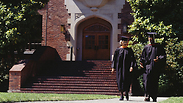
Battle for Israel's future should be fought on US campuses
Op-ed: For the first time in decades, a coordinated pro-Israel student grassroots movement is gaining momentum in American universities.
Since then, over seven campuses across America tried to pass anti-Israel resolutions, calling for universities’ leadership to cut ties with Israeli companies and boycott Israeli products.
Thankfully, a counter movement defending Israel on campuses stopped this momentum. For the first time in many years, this high-profile fight over Israel did not take place on Capitol Hill, nor was it confronted in local state legislatures.
Instead, it was fought on campuses, wherever the BDS movement tried to raise its head and attack Israeli interests.
From the University of Michigan to UCLA , from the University of Minnesota to Chicago’s Northwestern University, pro-Israel students protested, signed petitions, formed coalitions and countered resolutions that tried to single out Israel and delegitimize its character as a Jewish state.
The great attention drawn toward that fight is changing how we should approach pro-Israel work in America. While it remains crucial to meet with local representatives and senators in order to keep Congress one of the most pro-Israel institutions in the world, there must be a realization of the increased public attention to the challenges Israel faces on college campuses.
Israel’s detractors are well-organized, coordinated, and share the same name under one umbrella organization. Pro-Israel activists, however, are more focused on lobbying representatives and are not collaborating regarding the grassroots efforts on campuses.
However, things are starting to change.
For the first time in decades, a coordinated pro-Israel student grassroots movement is gaining momentum. A group called SSI (Students Supporting Israel) started in Minnesota and grew to 10 other campuses across the country. SSI was the only movement in America that managed to pass a resolution this year that calls for bigger investments in Israel.
As a grassroots movement, SSI is looking to the future by operating under a single name across campuses and coordinating events throughout the 10 colleges to create a bigger impact. And this is just the beginning.
In order to stop the campaign to de-legitimize Israel, even within the 1967 borders, the pro-Israel grassroots community needs more resources and a better strategy. Today, there are already organizations that help advocate for Israel on campuses but that’s not nearly enough.
Coming to the United States as an Israeli Fulbright scholar, I could not believe the hate that comes out of campuses in the country that is Israel’s strongest ally.
Instead of pushing for comprehensive peace between Palestinians and Israelis, many pro-Palestinian student groups share many ideas with the Hamas, rather than the Palestinian Authority leadership. The main organization – Students for Justice in Palestine (SJP) – is calling for the removal of Israel, while repeating the famous chant, "From the river to the sea, Palestine will be free." Calling for self-determination of one people, while denying the right of the Jewish people to the same thing.
Some say that the attacks on Israel on campus are not a real threat to the Jewish state. What can a few resolutions of student bodies do, they say, especially when none of these resolutions have been adopted by any university? The answer is that they can cause a lot of damage.
Israel is fighting today for its future, not in the combat field but in the public opinion field. Any resolution that calls to divest from Israel should be seen as a lost battle.
And in this case, we should not lose any battle if we want to win the war.
The pro-Israel community in the US should fight this trend with all of its resources. It is not just the Hill but also the campuses we should lobby.
Naor Bitton, 28, is a Public Policy Fulbright scholar at the University of Minnesota. He interned as a policy and cabinet advisor to Minnesota Governor Mark Dayton and as an international intern on Capitol Hill for Congressman Jared Polis of Colorado.










